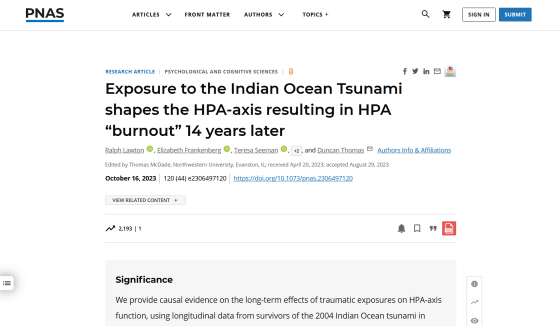Research results show that natural disasters like tsunamis continue to have a negative impact on the health of victims even after more than 10 years

2024 will mark 13 years since the Great East Japan Earthquake occurred on March 11, 2011.As of February 2023,
Exposure to the Indian Ocean Tsunami shapes the HPA-axis resulting in HPA “burnout” 14 years later | PNAS
https://www.pnas.org/doi/10.1073/pnas.2306497120

Study shows long-term health impacts after ex | EurekAlert!
https://www.eurekalert.org/news-releases/1004462
The Sumatra Earthquake that occurred in 2004 generated a tsunami that reached an average height of 10 meters, and the tsunami caused severe damage in coastal areas, even in areas that were not directly affected by the earthquake's shaking. In Indonesia in particular, the disaster caused over 130,000 deaths and over 30,000 people missing.
In addition to the physical damage caused by the disaster itself, these large-scale disasters also inflict deep psychological damage on the victims. A research team led by Duncan Thomas , Distinguished Professor of International Relations at Duke University in the United States, is conducting an ongoing research project called 'Study of the Tsunami Aftermath and Recovery (STAR).' I am continuing to research people who survived the tsunami caused by the Sumatra Earthquake.
As part of the STAR project, lead author Ralph Lawton of Harvard University and his colleagues collected hair samples from victims of the Sumatra earthquake 14 years after the earthquake and measured levels of the hormone cortisol . .
Cortisol is a hormone secreted by the adrenal cortex that normally increases in the body in response to stress, triggering the fight-or-flight response . However, when exposed to chronic or acute stress, there are cases in which the hypothalamus-pituitary-adrenal (HPA) axis, which is responsible for hormone secretion, malfunctions and hormone levels become disordered.

After analyzing the hair of 615 people, researchers found that those who lived in areas affected by the tsunami following the Sumatra earthquake had lower cortisol levels than those in unaffected areas. This difference was mainly noticeable among women, with women who lived in severely affected areas having 30% lower cortisol levels than women who were not affected. On the other hand, men's cortisol levels were not significantly related to where they lived at the time of the tsunami.
The decrease in cortisol levels caused by the tsunami damage was greater in women who had higher levels of
These results suggest that the strong and long-term stress caused by the tsunami caused the HPA axis of the victims to burn out and become dysfunctional, resulting in a long-term decline in cortisol levels. 'A key finding is that people with lower cortisol levels had worse physical and psychosocial health 14 years after the tsunami,' Thomas said. This is proof that it is spreading.'

Related Posts:
in Science, Posted by log1h_ik







